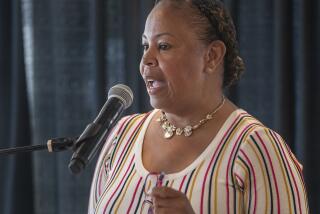Endorsement: Hilda Solis for the 1st Supervisorial District
Los Angeles County’s 1st Supervisorial District was a hard-won triumph of democracy. It was created in 1990 as a result of a voting rights lawsuit in which the Board of Supervisors was found to have drawn district lines to lock Latinos out of power in county government. A judge redrew the lines and Gloria Molina made history by becoming the board’s first Latino member since the 1860s.
------------
FOR THE RECORD
A May 14 endorsement of Hilda Solis for Los Angeles County supervisor in District 1 referred to Juventino “J” Gomez as a former El Monte city councilman. He is a current councilman.
------------
In addition to making the board more representative, Molina’s election ended its long-standing conservative majority and opened a new era in county government and politics. For her inauguration, she ordered the removal of metal detectors at the door of the board’s meeting room to symbolize a new spirit of openness to public scrutiny.
Now Molina’s tenure is ending, and three candidates, all Latinos from the San Gabriel Valley, are vying to succeed her: Juventino “J” Gomez, a longtime county employee and former El Monte City councilman; April Saucedo Hood, a Long Beach Unified School District police officer; and Hilda Solis, former state lawmaker, congresswoman and most recently U.S. secretary of Labor. Gomez and Hood deserve credit for their effort, but Solis is by far the most qualified candidate. The Times recommends Solis — although not without some regret.
The regret has less to do with Solis herself than with the exasperating fact that voters in this district once again have little actual voice in picking a representative. On the other side of the county, a host of viable candidates for the 3rd Supervisorial District are debating their positions, proposals and plans. There is no such dialogue in the 1st District, largely because the political establishment preselected Solis and found alternative paths to advancement for other would-be contenders. Solis’ victory is virtually assured, allowing her to remain publicly sketchy on her agenda for the county.
Molina’s tenure offers some lessons that Solis should heed. For example, Molina became part of a new liberal majority, but her independence and the county’s brush with bankruptcy in the mid-1990s led her to place a premium on solvency and unbroken service to county constituents, even at the expense of her labor support. That was a difficult but responsible move.
Meanwhile, though, the metal detectors are back, and Molina has joined her colleagues in their penchant for doing public business in private. Voters should demand more openness from Solis, but her performance as a candidate — skipping some candidate forums, expressing the bare minimum regarding her positions on crucial county issues — may justify at least as much foreboding as hope.
More to Read
A cure for the common opinion
Get thought-provoking perspectives with our weekly newsletter.
You may occasionally receive promotional content from the Los Angeles Times.










